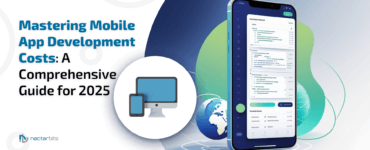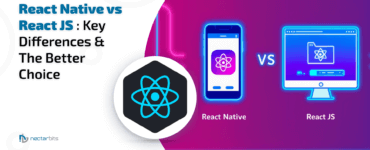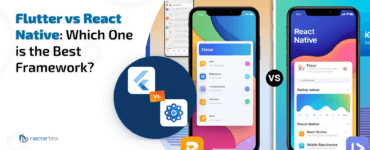Cross-platform software works on multiple operating systems and devices. In recent years, web-centric development has given way to mobile apps. The developers have also kept pace with the dynamic new technologies. They use cutting-edge mobile app development frameworks to develop their products.
Tech-savvy users purchase the latest Android and Apple phones. They expect fresh, productive apps with knock-out features. In the past, traditional developers wrote individual codes for Android and iOS platforms. This native iPhone development method is rigid, restrictive, and not very profitable either.
As a result, the developers focussed on flexible apps with cross-platform capability. They relied on the latest software tools and mobile app frameworks. The cross-platform technologies assisted them in writing a single codebase for both Android and iOS systems.
Cross-platform mobile app frameworks
Software tools are essential for creating multi-platform mobile apps. They ensure compatibility on different operating systems or platforms. As of now, the most popular platforms are iOS, Android, and Windows. Developers use these tools to develop and launch hybrid mobile apps quickly.
The cross-platform mobile app frameworks are a blessing for developers. Many start-ups, small and, medium companies also benefit immensely from them. They use the software kit to build amazing hybrid mobile apps. They also use these tools to develop desktop applications and web services.
However, Android & iOS app development is the core area of concern. The developers build excellent apps for social media, fashion, business, games and, entertainment industries. These cross-platform, hybrid mobile applications are very reliable and easy to maintain.
Mobile App Frameworks – Main Advantages
Mobile app development companies derive many benefits from software tools. The development kits and mobile app frameworks have these advantages –
- Code reusability
- Cost-effectiveness
- Consistent UI components
- Generalized Cloud integration
- Reduced marketing time
- Convenient deployment/hosting
- Very few technical obstacles
Software tools have both advantages and drawbacks. Native developers who shift to hybrid mobile apps have to be careful in choosing the right frameworks. They have to avoid coding errors and ensure higher performance. Some tools are restrictive and they do not have firmware support.
Read more : How Cross-platform apps can help you to chase your dreams for eCommerce solutions?
The designers who deliver unimpressive UX fail to satisfy their customers. These problems can be overcome by following standard guidelines. Choosing the right framework, IDEs, editors, and programming language are also very important. Below are the top five frameworks for cross-platform app development, which are in trend.
Top 5 Cross-Platform Frameworks
React Native App Development
Facebook released this cross-platform framework in 2013. You can create high-performance apps for iOS and Android. You can code faster and more efficiently without sacrificing the UX. The top mobile apps include Walmart, Facebook Ads Manager, Tesla, Skype, Sound Cloud, Instagram, Uber Eats, etc.,
Main Features Native App Development
- A trusted, open-source framework for hybrid apps.
- Uses the popular and convenient JavaScript for coding
- A strong and active global community of developers
- Enhanced code sharing and responsive UI
- A plethora of third-party libraries and plug-ins
Read more : React Native 0.61 Fast Refresh- The Latest Update
Ionic Framework
The Ionic Framework is the most popular framework for high-quality, hybrid mobile apps. It is an npm module that requires Node.js to work. You can use web technologies to build apps with a single codebase. The open-source SDK recently shifted to platform-neutral web components.
Key Features
- Free framework with Cordova plug-in and CLI
- Rich library of UI components and front-end building blocks
- Compatible with AngularJS, React, and Vue.
- New web components speed uploading time.
- Facilitates beautiful designs and code simplicity
Xamarin App Development
This open-source mobile UI framework uses Microsoft’s C# for coding. The developers have built this framework on top of the .NET framework for multi-platform support. It facilitates code and UI sharing with Xamarin. forms. It has numerous base libraries, and multi-platform editors and tools.
Significant Features
- An excellent option for developing Gaming apps.
- Integrates well with Microsoft’s Visual Studio
- Support for Google emulator manager.
- Has custom controls and storyboard files
- You can create scalable, Cloud-powered mobile apps.
Flutter App Development
It is Google’s mobile UI toolkit for Flutter developing beautiful apps. It facilitates device API access, navigation, and testing. You can build modern apps using the libraries and 2D rendering engine. The core principles of this framework facilitate faster application development.
Best Features
- Enables creative designs for cross-platform apps
- Minimizes coding with Dart programming language
- Complex, customizable widgets for smooth UX
- Hot Reload to fix bugs and reduce testing time
- Native look and feel for both iOS and Android apps.
Adobe PhoneGap(Apache Cordova)
Adobe PhoneGap is a powerful framework that supports the JavaScript ecosystem. Developers can upload the code to a Cloud compiler to generate cross-platform apps, and it has plug-ins to access the mobile’s compass, camera, accelerometer, and microphone.
It uses Web Views with embedded HTML5 code to render the layouts. The powerful framework is usable on other mobile application platforms as their client engine’s backbone. Developers use it to build apps for Android, iOS, Windows Mobile OS, and BlackBerry.
Top Features
- You can develop free, commercial, and open-source apps.
- Excellent support with a large Cordova community.
- Robust back end and powerful libraries for top UI
- Reliable native APIS for superior user experience
- Develop apps quickly using CSS, HTML, and JavaScript.
In conclusion, the mobile app industry is very competitive. The developers cut down costs by relying on cross-platform frameworks. They can quickly launch a hybrid app with excellent features and functionality. The latest toolkits and APIs optimize the software development process.
However, the developers have to choose the right framework. They have to consider their app’s target audience, project’s requirements, and market trends. Based on these criteria, select the best cross-platform framework for mobile app development.








